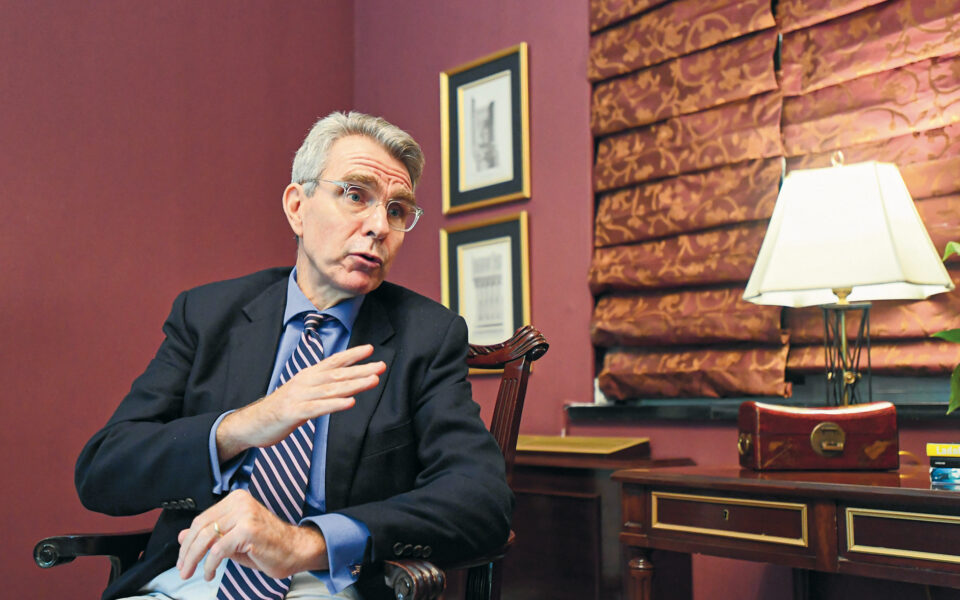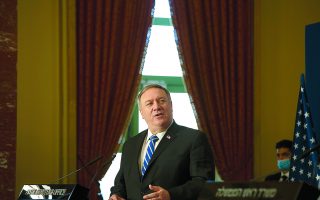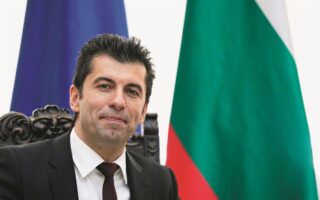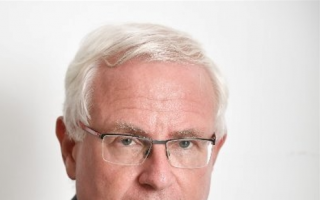US helped keep Aegean crisis from spiraling out of control
Outgoing American ambassador speaks to Kathimerini about tensions with Turkey, the Ukraine crisis and the Greek PM’s upcoming meeting with Biden

In the summer of 2020 Greece and Turkey were on the brink of open conflict, which required putting “a lot of energy into helping to keep things from spiraling out of control,” stresses outgoing United States Ambassador to Greece Geoffrey R. Pyatt in an interview with Kathimerini, noting that the situation was far more dramatic than what was shown by the news media.
He also mentions the unacceptable activities, the rhetorical excesses and silly statements made by Turkey on the sovereignty of the Greek islands, while also suggesting that Article 5 of the North Atlantic Treaty Organization acts as a security guarantee to Greece by the United States with respect to Turkey.
Pyatt also speaks of the strengthening of US-Greek relations during his five and a half years in Athens, a development that unfolded over three US and two Greek governments, proving the across-the-aisle and widespread support for this endeavor. It also underlines Greece’s strategic value, with the ambassador stressing that “Greece is a core part of the West.”
The 58-year-old career diplomat, who is expected to assume the role of assistant secretary of state for energy resources (one of the most important portfolios of the State Department at this time, which will also allow him to continue working with Greece), also discusses the imminent meeting of Greek Prime Minister Kyriakos Mitsotakis with US President Joe Biden in Washington, the war in Ukraine, which he says is a “battle between good and evil,” while he believes that it is incomprehensible for anyone to feel sympathy for Russian actions. Finally, he discusses Greece’s cautious approach to energy issues, pointing out that it is far less vulnerable than Germany and other European countries.
You had a long tenure in Athens. Five and a half years, three US administrations, two Greek governments, and the whole ideological spectrum. Was it difficult? Was it useful?
I will leave the judgments about utility and difficulty to the historians. I will say that I don’t think anything that’s happened in our relationship on either side, through any of the five governments involved, has happened by accident. It has taken hard work from both sides to get us where we are. I’m very proud of the team at the embassy here, during my tenure, and the sense of mission and dedication that they demonstrated and the creativity that they brought to the task. I’ve been privileged to have had outstanding Greek interlocutors through multiple governments, and I’m very grateful for the access and the respect and the collegiality they demonstrated. They’re all very different in so many ways. I’m very optimistic about what the future holds, because of the architecture and the institutions that we’ve established and that’s the ultimate measure of success in these jobs. I’m very grateful personally for the commitment that the prime minister has demonstrated to us, but also for his real hospitality. I’ve been really privileged to be here at this particular time and to be part of a story of rebirth. But also to be here for long enough that I can actually measure a very specific way, how different things look today, compared to what they did in September of 2016.
Can you take us through the two meetings the two Greek prime ministers had with former US presidents?
Very different. Also came at different times. One of the things that I’m quite proud is of that bipartisan commitment that we have seen to the US-Greece relationship, Republicans and Democrats. Everybody knows President Biden’s commitment to this relationship, Tony Blinken’s, Senator Menendez’ commitment to this relationship, but it’s also really important that we were able to have the kind of support that we had from Mike Pompeo, from Chairman Risch and Chairman Corker before him. That’s something Greeks should not take for granted. Because at a time when American politics has been very divisive, there are relatively few issues that have enjoyed the kind of bipartisan support that the US-Greece relationship is founded upon. That support is rooted in our shared values, but it’s also rooted in an active and increasingly activist diaspora, the relationship between Greece and Israel. So, I think both meetings that I was part of were premised on the idea that the United States wants a strong economically healthy, militarily secure, socially stable Greece, something that advances American interests because of how we look at this part of the world.
That might have been a given with Obama or Biden, but I was wondering if you were worried, under the Trump administration or Trump personally, about what might happen?
I’ll just say I got a lot done in the US-Greece relationship, working for Mike Pompeo, working with Wilbur Ross, with General Mattis. I will let the historians judge how much of that progress depended on having the right advice coming from the team at the Athens Embassy, but what I will say is I think there is nobody who would have assumed in January of 2017 that things would progress as strongly and as positively as they did in the subsequent four years. Concerning all these administrations and governments, meetings at that level, if you’re the guy on the ground, you’re always anxious. There is a lot at stake and because of how our government is organized, those kind of meetings can have a dramatic impact. And I’m proud to say that, by and large, the impact has been for the good.
About Prime Minister Mitsotakis’ trip to Washington in January 2020, we were extraordinarily lucky about the fact that it happened before the pandemic because it gave us a huge burst of positive momentum.
In a recent interview with Mike Pompeo, he mentioned the summer of 2020, noting that he was on the phone with his ambassadors in Athens and Ankara. Did Greece and Turkey come close to a confrontation?
Certainly it felt to be as severe a crisis as the countries have encountered since Imia in 96, and I’ve lived many other incidents between the countries. But this was different because the stakes were very high, the risks of miscalculation were extraordinarily high and you actually had a military accident that could have gone catastrophically wrong with just a slightly different set of circumstances. So Secretary Pompeo shared with you how intensively we all worked on this and how it had grabbed his attention at the most senior levels of the Trump administration.
To share a story, when the secretary called me and said he was proposing to come to Greece, I said: “That’s great, Mr Secretary, but let me try an idea out on you. Instead of coming to Athens, why don’t I take you to Thessaloniki, which no secretary of state in history has ever done before? As long as you’re coming all this way, please also go to Souda Bay, because I want you to see how much we’re doing together in our military relationship.” But part of the choice of Souda Bay was also to demonstrate US engagement and US presence in the Eastern Mediterranean, because Souda is that much closer to where the crisis threatened to erupt. It was a very good place to talk about our interests, visibly Libya, about our concern for some of these issues of maritime delimitation in the Eastern Mediterranean and our interest in seeing all of these issues resolved on the basis of international law and not on the basis of provocative, unilateral military actions. So that was a very important part of the diplomatic story as well. But one thing that I’m proud of is the very strong partnership with the Ankara embassy and the work that I have done. And now I was really pleased that we were able to get Jeff Flake to come here to Athens and to Delphi so early in his tenure. And he had extremely positive encounters with Prime Minister Mitsotakis and Foreign Minister Dendias. And I think he got a strong sense of both how much possibility there is around the US-Greece relationship, how anxious people in Greece are about some of these unresolved maritime issues, and the importance of American engagement and American diplomacy to keep things as they should be between NATO allies. So, that was very beneficial. The partnership between the two embassies is something that’s very important. I’ve encouraged George Tsounis to invest in the same because it’s really important that we work together.
Things have dramatically improved from what they were in the summer of 2020, when it was more severe than what’s sometimes understood in the press.
Did we come close to war, to put it bluntly?
I think you have to ask the governments that. And certainly the United States. You heard from Secretary Pompeo we thought it was a very severe crisis and we put a lot of energy into helping to keep things from spiraling out of control. The circumstances today are dramatically improved, even with all of the continued unacceptable activities, the overflights, the rhetorical excesses, the silly statements questioning the sovereignty of islands, which from an American standpoint is unquestionable.
The strategic landscape around the Aegean, the Black Sea, Asia Minor has changed dramatically since February 24, and I think the developments in Ukraine make it even more important to the United States to do everything that we can to make sure that Turkey behaves as a good NATO ally vis-a-vis all its neighbors. And again, this is not the time when we need distractions, whether generated by politics or rhetoric or military maneuvers.
A message to your successor, Ambassador Tsounis?
The most important thing I told him was: “You’re inheriting an extraordinary embassy staff. Listen to them, empower them and you can’t go wrong.” It’s really true. I’m very proud of the team that we put together. I would also encourage him to get out of Athens. There is so much to discover in Greece outside of Athens and Greek politics tends to be Athenian-driven but there is so much to discover both in terms of some of the economic issues and investment issues that have importance to us. Obviously continuing to demonstrate the commitment that the US has demonstrated to a very strong business, social, educational presence in Thessaloniki is very important. Alexandroupoli is a whole other story, we will continue as US government to work on the energy connections out there, to be involved in the privatization. Thirdly find opportunities to talk to young people.
Greece is redrawing the energy map
How do you deal, the “day after,” with the leader of a nuclear power whom you described as a war criminal. And also, the West encouraged Ukraine, but offered no security guarantees. Some, including in the US, say the West pushed Russia to act the way it did.
When you say the West, you’re talking about all of us, and one of the things that has changed about Greece, over the time that I’ve been ambassador here, is that today nobody questions the fact that Greece is a core part of the West. In fact, it is right in the middle of the story in terms of shaping the European and transatlantic response to this crisis.
Putin’s actions in Ukraine are a challenge to all of us. Particularly to Greece, as a country which is on NATO’s frontier, which has a deep attachment to the values of democracy that the Ukrainians themselves are fighting for. Greece has a relationship with Ukraine for reasons of history and values and interests. And certainly one of the consequences of this war will be that the center of geopolitics of Europe is going to shift to the East and to the South. I take fundamental issue with anybody who suggests that the responsibility for this war rests with anyone other than Vladimir Putin and his enablers in Moscow. Those saying that somehow overlooked that it is the Ukrainians who have chosen to move towards European institutions. And everything that Vladimir Putin has done since the fall of 2013 has only accelerated that shift in opinion and you have a Ukraine today which is more united than it has ever been and is content to be part of a larger European community.
Former ambassador in Moscow – now CIA director – Bill Burns had noted that NATO’s expansion is seen by all in Russia as a direct challenge.
I will leave the historical judgments to the historians. I will point out the obvious fact that Russia’s borders with NATO are miniscule even today and that it is not the US or Europe which presented the Ukrainians with a “with us or against us” choice. And this I know very well because I lived through it in 2013, which is when the Kremlin went to Viktor Yanukovych and essentially ordered him to abandon the EU association agreement, using a combination of threats and coercion and economic inducements.
You asked how we envision a future relationship with a Russian leadership that has committed war crimes. Frankly, I think it’s too early for that conversation. But one lesson of this crisis and one of its few benefits has been to reaffirm the importance of our transatlantic community. It’s given the Biden administration an opportunity to demonstrate very dramatically Washington’s commitment to our alliance, to consultation with our allies, to working on the whole range of issues that are part of the toolkit of Russian malign influence, not just military and security reinforcement, but also energy security, and energy diversification.
However, Russia is a big player, so how do you find some modus vivendi to go forward if he’s a war criminal?
That’s a question that all of us have to answer together as a transatlantic community. It will depend on the conditions under which the war ends. And we welcome the fact that Foreign Minister Dendias, like so many other European leaders, has spoken so clearly on the issues of war crimes.
Greece has sent military equipment. Some say we could have sent humanitarian aid. Also, what about the significance of Alexandroupoli and other facilities?
First of all, the Greek response. Vitally important. The most important aspect of it was the totally unambiguous position of the prime minister that Greece will be on the right side of history. His clear recognition that this was an issue that transcends Ukraine and goes to the whole question of the international order and what the future is going to look like.
Second, the leadership that the Greek Foreign Ministry exercises, the diplomatic presence in the humanitarian assistance and then the vitally important security assistance is not just symbolic. It’s vitally important that we give Ukrainians the tools to defend themselves. This is the only way to solve the humanitarian crisis.
Then, in terms of facilities, they’ve all been vitally important. Souda Bay is busier than ever. The Harry S Truman carrier battle group has been in Greek waters almost continuously for the past two months. The facilities that we use out of Volos and Stefanovikeio, the UAVs operating out of Larissa and Alexandroupoli, and many others, demonstrating the strategic value of that location and the importance of the agreement that we reached under the MDCA.
A higher percentage of Greeks seem to be more understanding toward Russia.
Reading in newspapers the atrocities they have done, how can you imagine any sympathy for Russia? The rapes, the murders, the basement torture chambers. It’s so heartbreaking that any sympathy or understanding to why Russia was so upset misunderstands the nature of the battle between good and evil that’s unfolding in Ukraine today.
How do you see Greece’s energy presence – moving forward with exploring its own gas reserves, TAP, Revithoussa, IGB, the FSRU in Alexandroupoli? And also, how do you respond to people who say the US is benefiting from pushing Russia off the gas global market?
Concerning your second question. There is much concern in the US among American voters about the price of petrol at the station. This is a political challenge for President Biden, as it is for Prime Minister Mitsotakis and every leader in Europe. So, we are not benefiting from this.
On the question of energy security and energy diversification, bravo to Greece for having identified this priority much earlier than many others in Europe. While Germany was still constructing Nord Stream II and deepening its dependence on Russian gas, Greece was building the TAP pipeline, was expanding Revithoussa, was building the IGB, and was moving ahead with the Alexandroupoli FSRU. All these projects have been important to Greece’s relative energy security at this particular moment, but much more so to the role that Greece is now playing as energy security enabler for its neighbors. In so many ways Greece is redrawing the energy map of Southeastern Europe because Greece is the answer to vulnerability to Russian energy coercion. And the other part of the equation is getting all of our economies off of the dependence on oil and gas. And here too the Greek government has been ahead of the curve. Prime Minister Mitsotakis went all in on renewables, accepting the short-term political cost of energy transition, in part for climate reasons, but now also for energy security reasons.
I think the East Med gas will pass in Europe through Greece. The US strongly supports energy connectivity in the Eastern Mediterranean. That’s one of the reasons we championed the 3+1 process since 2018. It’s clear that the diversification of energy sources has become even more important since the 24th of February, but it’s also important to get that gas to market as quickly as possible. The quickest way is to move it from Israel or Egypt to European markets. Greece is going to play a central role in that, both because of geography, but also because shipowners play such a dominant role in the global LNG trade.
About interconnectors, the United States has spoken very clearly their support for the EuroAsia, the EuroAfrica, and the idea of bringing renewable electricity from Egypt to European markets through Greece.
On the Mutual Defense Cooperation Agreement. Some people are asking why some islands are not included. Why there are no security guarantees?
In June of 2019, shortly before the elections in Greece, I met with Kyriakos Mitsotakis, who was leader of the opposition. We talked about the elections to come and his determination, if elected, to accelerate and deepen the US-Greece relationship. We talked about the MDCA and I said to him that this was an issue that had been a priority for the US over a number of years ago, and that I also believe that both of our militaries saw advantage in identifying additional facilities, opportunities for further US investment and mechanisms to build even stronger interoperability. Two and a half years now, one of the things I’m proudest of, is how quickly we were able to move on that vision, to sign the amendments. The US has tried to be a good partner with every means of support, but especially with software, especially at a moment when Greece’s strategic neighborhood is not becoming any easier. And it’s a source of confidence for Greece to have this visibly close partnership. Of course, I think there’s more that we can do together and it’s going to be driven first and foremost by the military leaderships in the two countries.
Allow me to come back to the security guarantees. Is it too much to ask of your superpower ally in this difficult neighborhood just described?
There is Article 5. You have heard from President Biden an absolutely unequivocal commitment to it, and the willingness to put US forces, equipment and treasury on the line to reinforce and defend that guarantee.
Even if the threat is from within the Alliance?
Article 5 is the basic foundation of everything that we do in terms of our security relationship with Greece and with NATO.
Ukraine, gas on agenda of Biden-Mitsotakis talks
What will top the agenda of the Biden-Mitsotakis meeting, and how does the president assess Greece’s location and role in light of the war?
I was especially thrilled to see the White House confirm the date for President Biden to host Prime Minister Kyriakos Mitsotakis in Washington on May 16, 2022. A little over a year ago, President Biden sent a video message to the Greek people to congratulate them on their bicentennial on March 25, 2021. That video message made clear just how much President Biden cares about Greece – in fact, he mentioned how sincerely he wished he would be able to visit Greece again. So, I know how important this invitation was to him personally and how important it was because the entire US government deeply values its relationship with Greece.
The leaders will discuss ongoing efforts with allies and partners to support the people of Ukraine and impose economic costs on Russia for its unprovoked invasion. The prime minister’s visit will give our two leaders the opportunity to have discussions about how we and other NATO allies are working together to give the Ukrainian people the defensive military tools they need to repulse Putin’s brutal campaign. This is in addition to the full range of bilateral issues, including Greece’s admirable response in support of the people of Ukraine, as well as economic cooperation and joint efforts to combat global challenges like climate change and energy security. And of course, it will also provide an opportunity for them to honor the history and democratic values that have formed the foundation of the US-Greek relationship for now more than two centuries.
In addition to the president’s longstanding relationship with Greece, as we know, Greece has enjoyed strong bipartisan support in Washington for many years. Our leadership understands how important a geopolitical role Greece plays in this region. As it relates to the current situation, President Biden has made a very strong commitment to helping facilitate Europe’s very welcome effort to reduce its vulnerability to Russian energy manipulation by diversifying sources and routes for energy supplies. So, our work with Greece on projects like the Alexandroupoli floating regasification unit, the expansion of the Revithoussa Terminal, the gas interconnector Greece-Bulgaria (IGB), Greece-North Macedonia gas interconnector, and the proposed East Mediterranean electricity interconnections offer the prospect of Greece developing its role as a hub for bringing those gas resources to countries in Europe which are much more vulnerable than you are to the manipulation of Russian energy supplies.
I am enormously honored to have recently been nominated by the president to undertake the role of assistant secretary of state for energy resources. If confirmed, I look forward to remaining engaged on energy issues where Greece plays such an important role.





